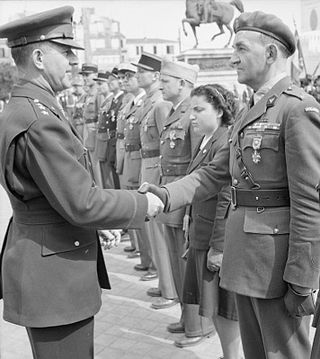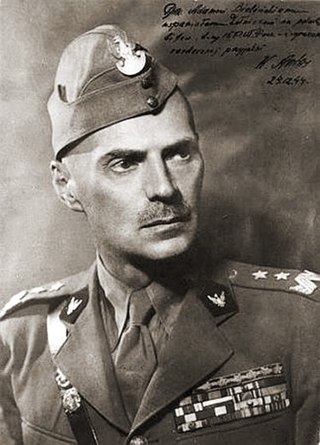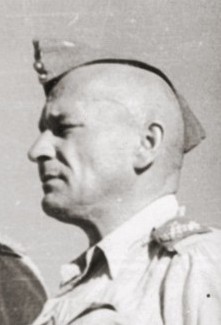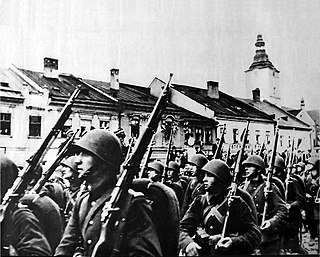Related Research Articles

The history of interwar Poland comprises the period from the revival of the independent Polish state in 1918, until the Invasion of Poland from the West by Nazi Germany in 1939 at the onset of World War II, followed by the Soviet Union from the East two weeks later. The two decades of Poland's sovereignty between the world wars are known as the Interbellum.

The history of Poland from 1939 to 1945 encompasses primarily the period from the invasion of Poland by Nazi Germany and the Soviet Union to the end of World War II. Following the German–Soviet non-aggression pact, Poland was invaded by Nazi Germany on 1 September 1939 and by the Soviet Union on 17 September. The campaigns ended in early October with Germany and the Soviet Union dividing and annexing the whole of Poland. After the Axis attack on the Soviet Union in the summer of 1941, the entirety of Poland was occupied by Germany, which proceeded to advance its racial and genocidal policies across Poland.

The Polish Workers' Party was a communist party in Poland from 1942 to 1948. It was founded as a reconstitution of the Communist Party of Poland (KPP) and merged with the Polish Socialist Party (PPS) in 1948 to form the Polish United Workers' Party (PZPR). From the end of World War II the PPR led Poland, with the Soviet Union exercising moderate influence. During the PPR years, the centers of opposition activity were largely diminished, and a socialist system was established in the country.

Oskar Ryszard Lange was a Polish economist and diplomat. He is best known for advocating the use of market pricing tools in socialist systems and providing a model of market socialism. He responded to the economic calculation problem proposed by Ludwig von Mises and Friedrich Hayek by claiming that managers in a centrally-planned economy would be able to monitor supply and demand through increases and declines in inventories of goods, and advocated the nationalization of major industries. During his stay in the United States, Lange was an academic teacher and researcher in mathematical economics. Later in socialist Poland, he was a member of the Central Committee of the Polish United Workers' Party.

Wanda Wasilewska, also known by her Russian name Vanda Lvovna Vasilevskaya, was a Polish and Soviet novelist and journalist and a left-wing political activist.
Marek Jan Chodakiewicz is a Polish-American historian specializing in Central European history of the 19th and 20th centuries. He teaches at the Patrick Henry College and at the Institute of World Politics. He has been described as conservative and nationalistic, and his attitude towards minorities has been widely criticized.

Mieczysław Zygfryd Słowikowski, also known as "Rygor-Słowikowski," was a Polish Army officer whose intelligence work in North Africa facilitated Allied preparations for the 1942 Operation Torch landings.

Union of Polish Patriots was a political body created by Polish communists in the Soviet Union in 1943. The ZPP, unofficially controlled and directed by Joseph Stalin, became one of the founding structures of the Soviet-controlled communist government that after World War II took power in Poland.

Anders' Army was the informal yet common name of the Polish Armed Forces in the East in the 1941–42 period, in recognition of its commander Władysław Anders. The army was created in the Soviet Union but, in March 1942, based on an understanding between the British, Polish, and Soviets, it was evacuated from the Soviet Union and made its way through Iran to Palestine. There it passed under British command and provided the bulk of the units and troops of the Polish II Corps, which fought in the Italian Campaign. Anders' Army is notable for having been primarily composed of liberated POWs and for Wojtek, a bear who had honorary membership.

Bronisław Stanisław Rakowski was a Polish general. He fought in the Polish legions during World War I. As a Colonel defending Lviv he refused entry to the Soviet Army during the Soviet invasion of Poland, instead suggesting the Soviets advance on German positions, and after the city capitulated, was later imprisoned by the Soviet NKVD. During World War II, he fought in the Anders Army and Polish Armed Forces in the West.
Tadeusz Piotrowski or Thaddeus Piotrowski is a Polish-American sociologist and author. He is a professor of sociology in the Social Science Division of the University of New Hampshire at Manchester in Manchester, New Hampshire.
Yitzhak Wittenberg was a Jewish resistance fighter in Vilnius during World War II. He was a member of the Communist Party. He was the commander of the Fareynikte Partizaner Organizatsye (FPO), a resistance group in the Vilna Ghetto which was preparing an uprising should the final moments of the ghetto come. When the Germans learned about the existence of a Communist, Wittenberg, in the ghetto, they made a request to the head of the Jewish council, Jacob Gens, that Wittenberg should be surrendered to them. Gens betrayed Wittenberg to the police who arrested him, but he was freed by young FPO fighters. Subsequently, Gens insisted that Wittenberg surrender. Feeling he did not have the support of the ghetto for an uprising and fearing a massacre, he surrendered.
Halik Kochanski is a British historian and writer of Polish origin.

The Battles of Parczew, Jabłoń and Milanów constituted one of the major battles between the Polish Army and the Red Army during the Soviet invasion of Poland. They took place on September 29–30 of 1939 at the beginning of the Second World War. They resulted in a Polish victory, as the Polish units successfully broke through the Soviet forces near the town of Parczew and progressed towards the Świętokrzyskie Mountains.

Corruption in Poland is below the world average but not insignificant. Within Poland, surveys of Polish citizens reveal that it is perceived to be a major problem.

The Polish White Book is a semi-official name of a series of comprehensive reports published during World War II by the Ministry of Information of the Polish government-in-exile in London, England, dealing with Polish-German relations before and after the 1939 German-Soviet aggression against Poland.

The Polish Underground and the Jews, 1939–1945 is a book by American historian Joshua D. Zimmerman, published in 2015 by Cambridge University Press, discussing relations between Poland's Jewish population and the Polish resistance in World War II. Zimmerman argues that polarized narratives, one picturing the Polish underground as anti-Semitic and murderous toward Jews and the other hand as heroically rescuing them, are oversimplified; in fact, different segments and members of the Home Army behaved in diverse ways. The book has received mostly-positive reviews for its evenhanded treatment of a contentious subject matter.

Beyond Violence: Jewish Survivors in Poland and Slovakia, 1944–48 (2014) is a book by the Polish historian Anna Cichopek, based on her PhD thesis at the University of Michigan, which examines Holocaust survivors in postwar Poland and Slovakia and how they went about regaining their Aryanized property, obtaining citizenship in their country of residence, and dealing with violence from non-Jews.
This is a select bibliography of English language books and journal articles about the history of Poland. A brief selection of English translations of primary sources is included. Book entries have references to journal articles and reviews about them when helpful. Additional bibliographies can be found in many of the book-length works listed below; see Further reading for several book and chapter-length bibliographies. The External links section contains entries for publicly available select bibliographies from universities and national libraries. This bibliography specifically excludes non-history related works and self-published books.
This is a select bibliography of English language books and journal articles about the history of Poland during World War II. A brief selection of English translations of primary sources is included. Book entries have references to journal articles and reviews about them when helpful. Additional bibliographies can be found in many of the book-length works listed below; see Further Reading for several book and chapter-length bibliographies. The External Links section contains entries for publicly available select bibliographies from universities. This bibliography specifically excludes non-history related works and self-published books.
References
- 1 2 "The vivisection of Poland". The Economist. 29 September 2012. ISSN 0013-0613 . Retrieved 2023-01-03.
- ↑ Wróbel, Piotr (2015). "The Eagle Unbowed. Poland and the Poles in the Second World War by Halik Kochanski (review)". Shofar: An Interdisciplinary Journal of Jewish Studies. 33 (3): 151–153. doi:10.1353/sho.2015.0014. ISSN 1534-5165. S2CID 143910948.
- ↑ Radzilowski, John (2014-12-01). "The Eagle Unbowed: Poland and the Poles in the Second World War. By Halik Kochanski. (Cambridge, MA: Harvard University Press, 2012. Pp. xxxi, 734. $35.00.)". The Historian. 76 (4): 866–867. doi:10.1111/hisn.12054_51. ISSN 0018-2370. S2CID 145389204.
- ↑ Plach, Eva (March 2014). "The Eagle Unbowed: Poland and the Poles in the Second World War . By Halik Kochanski.Cambridge, MA: Harvard University Press, 2012. Pp. xxxii+734. $35.00". The Journal of Modern History. 86 (1): 220–221. doi:10.1086/674288. ISSN 0022-2801.
- ↑ Meng, Michael (2014). "Review of The Eagle Unbowed: Poland and the Poles in the Second World War". Slavic Review. 73 (3): 651–652. doi:10.5612/slavicreview.73.3.651. ISSN 0037-6779. JSTOR 10.5612/slavicreview.73.3.651. S2CID 164625375.
- ↑ Grabowski, Jan (2013). "Eagle Unbound". Israel Journal of Foreign Affairs. 7 (3): 195.
- ↑ Evans, Richard J (2012-11-09). "The Eagle Unbowed by Halik Kochanski – review". The Guardian. Retrieved 2023-01-03.
- ↑ "The Eagle Unbowed: Poland and the Poles in the Second World War – Halik Kochanski". Culture.pl. Retrieved 2023-01-03.
- ↑ Applebaum, Anne (2012-12-20). "Poland in the Darkness of World War II". The New Republic. ISSN 0028-6583 . Retrieved 2023-01-03.
- ↑ Polonsky, Antony (2013-02-08). "In the barn". TLS. Times Literary Supplement (5732): 22–23.
- ↑ Michnik, Wojciech (2013). "The Irony of Polish History". New Eastern Europe. 1 (6): 148–150. ISSN 2083-7372.